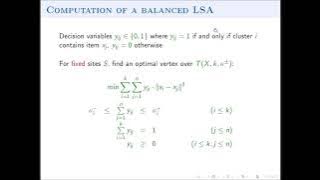
Lecture 1: Introduction MIT 6.824: Distributed Systems (Spring 2020) https://pdos.csail.mit.edu/6.824/
From playlist MIT 6.824 Distributed Systems (Spring 2020)

Cloud: IaaS, PaaS, SaaS, and Linux, part 1/2 (2018)
IMT2681 Cloud Technologies: IaaS, PaaS, SaaS, and Linux. Brief notes on IaaS, PaaS, and SaaS plus start to the Introduction to Linux.
From playlist Archive - Cloud Computing

Eva Darulova : Programming with numerical uncertainties
Abstract : Numerical software, common in scientific computing or embedded systems, inevitably uses an approximation of the real arithmetic in which most algorithms are designed. Finite-precision arithmetic, such as fixed-point or floating-point, is a common and efficient choice, but introd
From playlist Mathematical Aspects of Computer Science

O'Reilly Webcast: How to Decrease the Pain in Building Distributed Systems
Presented by Bradford Stephens. Building distributed systems is painful. Many organizations are approaching the point where their data and application infrastructures are being run on many servers (in the cloud or datacenter). Our software practices don't reflect that, often with disastrou
From playlist O'Reilly Webcasts

Stack Data Structure - Algorithm
This is an explanation of the dynamic data structure known as a stack. It includes an explanation of how a stack works, along with pseudocode for implementing the push and pop operations with a static array variable.
From playlist Data Structures

Personal Computer Architecture
This computer science video includes useful information if you are thinking of buying, building, upgrading or overclocking your own personal computer. It also serves as a basis for further study of individual components such as DRAM or GPUs. The video introduces the architecture of a mod
From playlist Computer Hardware and Architecture

IMT4306: Intro to Mobile/Decentralised - Summary
IMT4306 Intro to Research in Mobile and Decentralised systems Summary lecture.
From playlist 2021 - IMT4306 - Mobile Research

Steffen Borgwardt: The role of partition polytopes in data analysis
The field of optimization, and polyhedral theory in particular, provides a powerful point of view on common tasks in data analysis. In this talk, we highlight the role of the so-called partition polytopes and their studies in clustering and classification. The geometric properties of parti
From playlist Workshop: Tropical geometry and the geometry of linear programming

IMT4889: Distributed Databases. RISC vs CISC.
IMT4889: Specialisation course. Distributed Databases. CAP theorem. RISC vs. CISC. ARM vs INTEL.
From playlist Archive - Research in Mobile/Wearable Tech

Statistical Rethinking 2022 Lecture 06 - Good & Bad Controls
Slides and other course materials: https://github.com/rmcelreath/stat_rethinking_2022 Intro video: https://www.youtube.com/watch?v=6erBpdV-fi0 Intro music: https://www.youtube.com/watch?v=Pc0AhpjbV58 Chapters: 00:00 Introduction 01:23 Parent collider 08:13 DAG thinking 27:48 Backdoor cri
From playlist Statistical Rethinking 2022

Lec 23 | MIT 6.00 Introduction to Computer Science and Programming, Fall 2008
Lecture 23: Stock market simulation Instructors: Prof. Eric Grimson, Prof. John Guttag View the complete course at: http://ocw.mit.edu/6-00F08 License: Creative Commons BY-NC-SA More information at http://ocw.mit.edu/terms More courses at http://ocw.mit.edu
From playlist MIT 6.00 Intro to Computer Science & Programming, Fall 2008

Lec 24 | MIT 6.00SC Introduction to Computer Science and Programming, Spring 2011
Lecture 24: Avoiding Statistical Fallacies Instructor: John Guttag View the complete course: http://ocw.mit.edu/6-00SCS11 License: Creative Commons BY-NC-SA More information at http://ocw.mit.edu/terms More courses at http://ocw.mit.edu
From playlist MIT 6.00SC Introduction to Computer Science and Programming

Lecture 16: Utility from Beliefs; Learning II
MIT 14.13 Psychology and Economics, Spring 2020 Instructor: Prof. Frank Schilbach View the complete course: https://ocw.mit.edu/14-13S20 YouTube Playlist: https://www.youtube.com/playlist?list=PLUl4u3cNGP63Z979ri_UXXk_1zrvrF77Q In this video, the professor continues the discussion of why
From playlist MIT 14.13 Psychology and Economics, Spring 2020

This video functions as a brief introduction to many different topics in formal logic. Notes on the Images: I looked into the legality of using images for this video a good deal and I've come to the conclusion that there is nothing in this video which could remotely imply these images ar
From playlist Summer of Math Exposition 2 videos

Keep Ruby Weird 2018 - Distributed Fizz Buzz... by Nathan Ladd & Scott Bellware
Keep Ruby Weird 2018 - Distributed Fizz Buzz: Passing the Microservices Interview by Nathan Ladd & Scott Bellware Scott Bellware is a short, bald man with 25 years of experience who works with development teams who have completely screwed themselves into an intractable mess of tightly-cou
From playlist Keep Ruby Weird 2018

QRM L1-3: Common fallacies in risk assessment
Welcome to Quantitative Risk Management (QRM). We close the first lesson by addressing some important fallacies, very common (unfortunately) in risk assessment. It is important not to fall into these fallacies, to avoid taking decisions that are, if we are lucky, useless, but that, more p
From playlist Quantitative Risk Management

Statistical Rethinking 2023 - 06 - Good & Bad Controls
Course details: https://github.com/rmcelreath/stat_rethinking_2023 Intro music: https://www.youtube.com/watch?v=PDohhCaNf98 Outline 00:00 Introduction 01:43 Causal implications 14:28 do-calculus 16:59 Backdoor criterion 40:48 Pause 41:22 Good and bad controls 1:09:34 Summary 1:26:27 Bonu
From playlist Statistical Rethinking 2023


